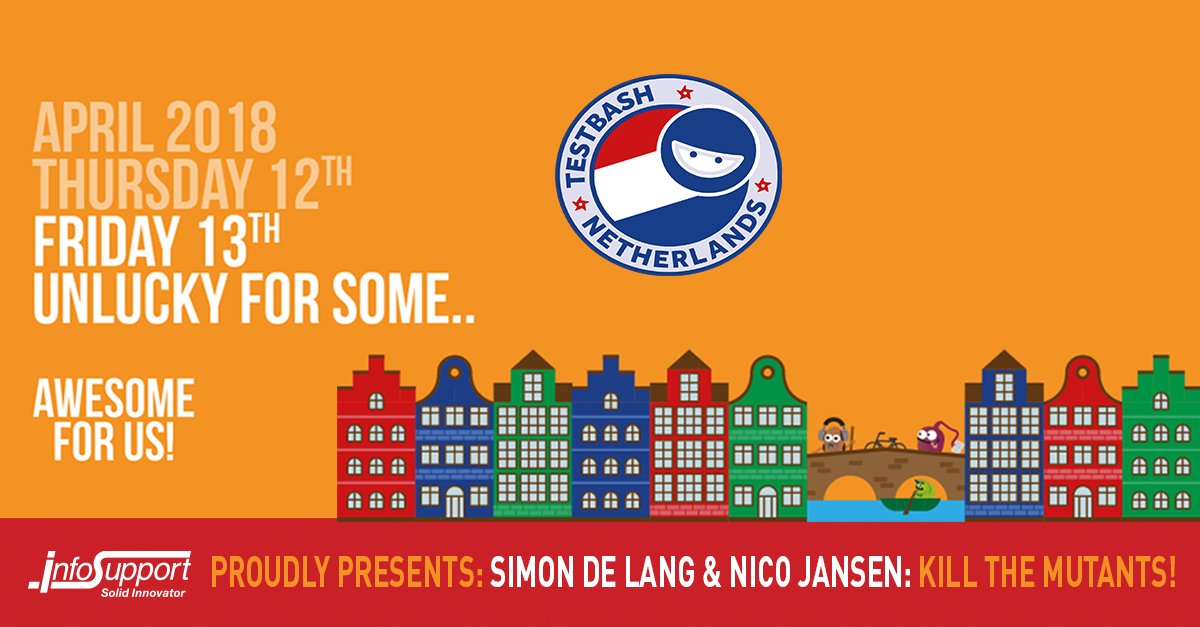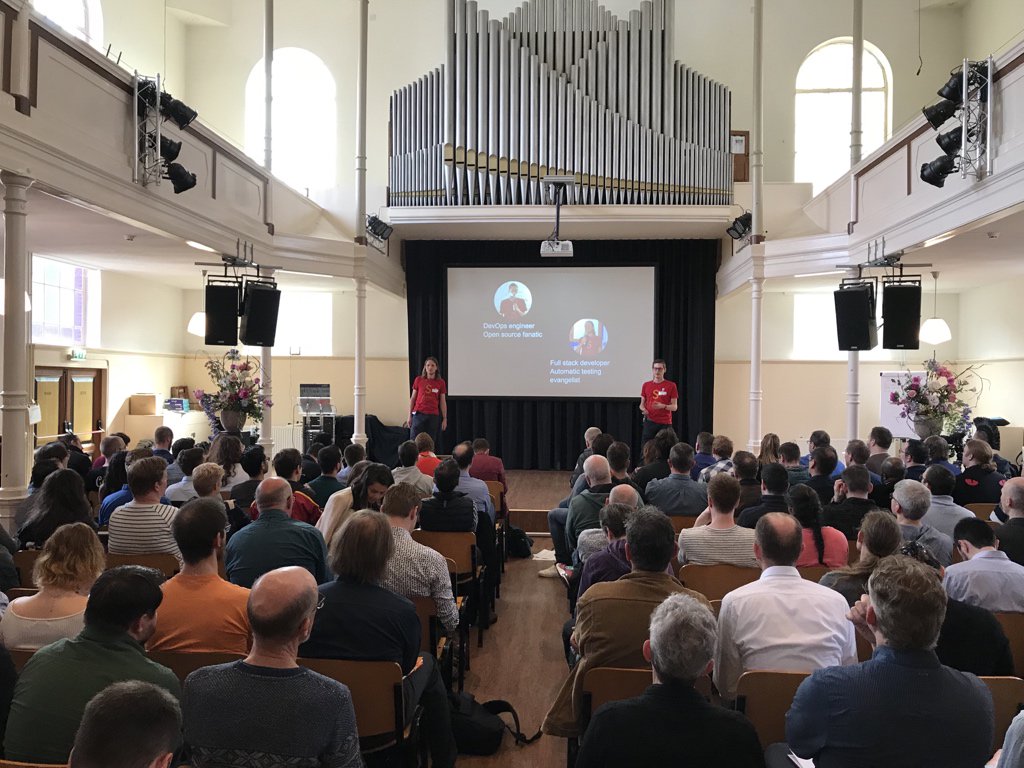
All videos are now available upon creating a free account on testbash video series 2018.
Last week I was at TestBash Netherlands in Utrecht to learn all about the latest techniques and tools used by testers. I was also there to support my colleagues Simon de Lang and Nico Jansen as they were speakers at the conference.
TestBash
For anyone who did not figure it out already, TestBash is a conference about software testing. It is organised by ministryoftesting in multiple countries, and is meant to be a place for all software testers to come together. This was the second year for TestBash in the Netherlands and the venue was packed. There were a surprising number of foreign guests present, some from as far as Canada. For this reason all talks were in English.
Talks
Because TestBash was a single-track conference there was space for 9 talks that day. For a full list of all talks and workshops that were present at the conference see https://dojo.ministryoftesting.com/events/testbash-netherlands-2018.
My own takeaway from some of the talk is as follows:
Mind Your Language – Unintentional Bias, Social Identity and Teamwork – David Evans
People like to place themselves in groups according to certain identity traits they feel are only available in their group. David Evans showed us how easy it is to identify a trait with a single group, when in fact the trait fits with multiple groups. In doing so it is very easy to exclude people from your thought processes and to dismiss their ideas as irrelevant. ‘Surely a developer does not have the right mindset and creativity to figure out how to test a piece of software? Only testers can do so!’ And vice versa. In healthy, agile cross-functional teams we should strive to include everyone as much as possible, and we should watch our words carefully as not to exclude our colleagues.
Go Old School – Why Test Techniques Aren’t Dead! – Sue Atkins
Sue tried to show us the value of old school testing techniques such as equivalence partitioning. Unfortunately the beamer at the conference had connectivity problems which meant that Sue was unable to show us her examples. Trying to explain formal testing techniques without being able to show examples proved to be impossible, which I think is a shame. It seems like this talk could have been excellent otherwise.
Encouraging Engagement – Changing Our Work Culture – Marianne Duijst
Personal and team accomplishments should be shared and celebrated more because they help build a tight caring team. It encourages people to respect each other and their team. This is especially crucial in today’s DevOps teams where testers and developers come together and increasingly solve the same problems.
Agile Test Management within Continuous Integration – Angie Jones
My main takeaway from this talk was that testers need to talk to developers more. Angie Jones as senior test automation engineer at twitter, came here to tell testers about the wonderful world of continuous integration. She explained how your functional tests can run in Jenkins, and what kind of problems you can expect when starting with this. Don’t get me wrong, I think it’s great that testers are starting to use these tools. But all I could think was, talk to any of us developers for one afternoon and we could have helped you with this. We ran into all the problems you’re describing years ago, and would be happy to assist.
Stryker – Kill the Mutants!

The highlight of the day was without a doubt the talk about Mutation Testing using Stryker Mutator. Even though their talk was very technical and even included code samples, it was the best received of the day. It was so good that people overlooked that they had a couple of developers on stage! Nico and Simon started off with a questionnaire about the sort of tests people used. It turned out that a surprising amount of people were already familiar with mutation testing or were using it (5 to 10). After the questionnaire they explained what unit testing is. They also showed how a high code coverage percentage does not necessarily mean that you have good tests. Finally they explained in clear terms what mutation testing tells you, and how it can be used to improve your unit tests.
It was clear that this audience was great for a talk about mutation testing. I learned from Simon that they had never had such an enthusiastic response from a crowd before. Testers really seem to like test tools, who’d have thought! All in all I would not be surprised if they end up being voted best talk of TestBash 2018.
For more information on Stryker Mutator see their homepage!
All talks were recorded on video. Once the videos are online I’ll update the article with the video url so you can watch the excellent stryker talk yourself.
Conclusion
TestBash was interesting to be at as a developer. Not because the talks were particularly relevant mind you. But rather because I could experience the world of testers a little bit. At least this year the conference seemed to be almost entirely focused on helping testers rediscover themselves in a agile world. It was very obvious that the tester attendees were not entirely comfortable in this new world. Most of them were working at companies that did not yet make the jump to agile teams. They were very much testers in tester teams. Most of the talks were focused on giving guidance to these testers about working together with people from other disciplines. It’s awesome to see them come together and help each other make the move.
But as a developer you won’t learn anything new here.
Unless the focus next year is completely different of course. Who knows!
In conclusion in conclusion:
Have a technical talk relevant to testing? Yea!
Want to find technical talks about testing? Maybe if Stryker is present..
All videos are now available upon creating a free account on testbash video series 2018.

 0 comments
0 comments ATDD
ATDD